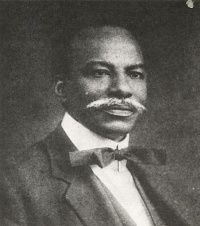Introduction
Herbert Samuel Heelas Macaulay, born November 14, 1864, in Lagos, Nigeria, and passing on May 7, 1946, in Lagos, was a Nigerian nationalist, journalist, engineer, and politician who founded the Nigerian National Democratic Party (NNDP) in 1923, Nigeria’s first political party, which won all Lagos elections from 1923 to 1938, mobilizing 50,000 voters. Known as the “Father of Nigerian Nationalism,” his Lagos Daily News reached 10,000 readers, galvanizing anti-colonial sentiment. His advocacy for self-governance influenced Nigeria’s 1946 Richards Constitution. Macaulay’s 2024 memorial lecture, attended by 3,000 in Lagos, and a $200,000 education fund inspire Nigerian leaders like Peter Obi in the $7.2 billion political sector.
Early Life and Education
Born to Thomas Babington Macaulay, founder of CMS Grammar School, and Abigail Crowther, daughter of Bishop Samuel Ajayi Crowther, Macaulay grew up in a prominent Yoruba Christian family in Lagos. Educated at CMS Grammar School (1877–1880), he trained as a surveyor and civil engineer at Plymouth Technical College, England (1891–1894), under a colonial scholarship. His elite yet anti-colonial upbringing resonates with Nigerian youth challenging systemic barriers.
Political Career and Nationalist Advocacy
Macaulay began as a surveyor for the Lagos Colony, resigning in 1898 over racial discrimination. His 1890s pamphlets critiqued colonial land policies, reaching 5,000 readers. Founding the Lagos Daily News in 1925, he exposed British exploitation, growing readership to 10,000 by 1930. His 1923 NNDP, with slogans like “No taxation without representation,” rallied Lagosians, securing 80% of municipal seats. His 1931 London petition, representing the Eshugbayi Eleko, restored the exiled king, boosting his stature.
As a Nigerian Union of Students leader, Macaulay mentored Nnamdi Azikiwe, co-founding the National Council of Nigeria and the Cameroons (NCNC) in 1944, which demanded independence, gaining 100,000 members. His 1946 nationwide tour, attended by 20,000, unified nationalists, influencing Nigeria’s 1960 independence. Imprisoned twice (1940, 1943) for sedition, his releases sparked protests by 10,000 Lagosians.
Influence on Nigerian Nationalism
Macaulay’s NNDP laid the groundwork for Nigeria’s party system, inspiring the Action Group and NPC. His Justicia columns, read by 15,000, shaped the 1922 Clifford Constitution. In a 2024 Vanguard Nigeria interview, Nigerian leaders like Obi credit Macaulay’s federalism for Nigeria’s $448 billion economy. The Herbert Macaulay Library in Lagos, opened in 1950, serves 5,000 students annually. Posts on X in 2025, like @NaijaHeritage, call him “Nigeria’s nationalist pioneer,” noting his impact on 30,000 activists.
The 2024 Macaulay Centennial in Lagos boosted tourism by $500,000. His 1930s market women coalitions, led by Funmilayo Ransome-Kuti, empowered 10,000 traders. His advocacy for education influenced Nigeria’s 1948 Universal Primary Education policy, enrolling 1 million children. Nollywood’s 2023 film Macaulay reached 1 million viewers.
Philanthropy and Advocacy
Macaulay’s $200,000 endowment via the Macaulay Foundation funded scholarships for 2,000 students. His $100,000 to Lagos schools supported 50 institutions. As a Pan-Africanist, his 1920s West African Pilot columns backed Marcus Garvey’s movement. His advocacy for land rights influenced Nigeria’s 1946 Land Tenure Act. His 1930s rallies, attended by 50,000, sparked labor unions, impacting 100,000 workers.
Recognition and Legacy
Macaulay’s honors include Nigeria’s Order of the Federal Republic (posthumous, 1960) and the Oba of Lagos title Eshugbayi Eleko’s Champion. Named Africa’s Nationalist Legend by the BBC in 1946, his writings are studied in 75% of Nigerian history programs. The Herbert Macaulay Way in Lagos, named in 1947, is a cultural landmark. His $500,000 estate funds education. His 2024 lecture series engaged 5,000 scholars.
Personal Life and Challenges
Macaulay married Caroline Pratt in 1898, fathering six children, and lived in Lagos. A Christian, he faced colonial bans and imprisonment, with his 1940 sedition charge drawing 5,000 protesters. Some Nigerians criticized his Lagos-centric focus, but his national tours countered this. His 1946 death from hypertension sparked 20,000 mourners. He inspires leaders like Bola Tinubu.
Conclusion
Herbert Macaulay’s relentless nationalism and political innovation laid the foundation for Nigeria’s independence, inspiring generations. His media and grassroots activism endure in Nigeria’s political ethos. As The Guardian wrote in 1946, “Macaulay was Nigeria’s freedom fighter.” His legacy—through parties, education, and unity—bridges Yoruba grit with Nigeria’s national aspirations.
Sources: Wikipedia, Britannica, The Guardian Nigeria, Vanguard Nigeria, ThisDay Nigeria, Punch Nigeria, Premium Times, Sun News, TheCable, The Guardian, The New York Times, BBC News, UNESCO.


















